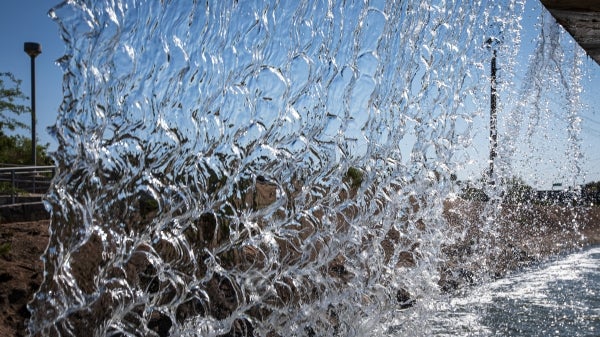ASU partners with education production company to share research with online learners

"SciShow" host Savannah Geary presenting on research from multiple School of Ocean Futures faculty as part of a co-produced video. Photo courtesy of SciShow/Complexly
Through Arizona State University’s partnership with Complexly education production companyfounded by brothers Hank and John Green, the online educational initiative Study Hall has forged a new pathway for students to earn college credits in courses like Intro to Sustainability — even before applying.
And for lifelong learners looking to stay up to date with science subjects and discoveries, "SciShow" may be just the Complexly product they're looking for. As of this winter, one of the series' episodes will feature scientific advancements from ASU faculty.
ASU Online and the College of Global Futures partnered with "SciShow" to co-produce an episode on different ways ASU researchers are advancing coral reef restoration, from Hawai‘i to Bermuda.
“Important research is not always accessible to people in the way it should be. ASU and Global Futures are dedicated to impactful research that improves people’s lives, our communities and the well-being of our planet,” said College of Global Futures Vice Dean Miki Kittilson.
“We have a responsibility in spreading awareness and access to that research. Partnering with organizations like Complexly is just one of the many ways in which we can achieve that.”
The "SciShow" episode, titled “Three Weird Ways Science Is Saving Coral Reefs,” features published works from three School of Ocean Futures faculty: Greg Asner, Liza M. Roger and Yvonne Sawall.
The College of Global Futures, which is the learning space within the Julie Ann Wrigley Global Futures Laboratory, comprises world-renowned faculty in areas such as sustainability, complexity, oceans and innovation.
The college's newest school — the School of Ocean Futures — includes scientists in Hawai‘i at the Center for Global Discovery and Conservation Science and Bermuda at the Bermuda Institute of Ocean Sciences, both of which contributed to ASU’s No. 1 ranking in addressing the United Nations’ Sustainable Development Goal of life below water.
The faculty works featured in the "SciShow" episode are:
- “Discrete Pulses of Cooler Deep Water Can Decelerate Coral Bleaching During Thermal Stress: Implications for Artificial Upwelling During Heat Stress Events” by Sawall, an assistant professor with the School of Ocean Futures and the Julie Ann Wrigley Global Futures Laboratory’s Bermuda Institute of Ocean Sciences, which was published in Frontiers in Marine Science in 2020.
- “Nanobiotech engineering for future coral reefs" by Roger, an assistant professor with the School of Molecular Sciences and School of Ocean Futures, which was published in One Earth in 2023.
- “Mapped coral mortality and refugia in an archipelago-scale marine heat wave" by Asner, director of the Global Futures Laboratory’s Center for Global Discovery and Conservation Science and a professor in the School of Ocean Futures, which was published in PNAS in 2022.
Research at ASU is growing at a rapid pace. The university will soon hit $1 billion in annual research funding, which is a feat accomplished by only 33 universities across the country.
Through partnerships such as this, ASU Online and the College of Global Futures hope to bring awareness of the research that is being done at ASU to the broader community. Access to education, whether that be through a formal online degree, certificate or even classes done through Study Hall, are all paramount to the success of ASU.
“These episodes were designed to reach a broad audience — from lifelong learners passionate about science to those simply curious about our oceans, conservation or discovering something new through social learning platforms like YouTube,” said Sean Hobson, chief design officer for EdPlus at ASU.
Hobson emphasized that partnerships like this one are key to broadening access to knowledge and amplifying the university's contributions.
“By showcasing groundbreaking research from our faculty scientists, we’re striving to make complex discoveries accessible and engaging, enabling them to spread with the same energy and reach as other viral content online. This kind of translation and dissemination is essential for achieving meaningful impact at speed and scale. Science communication needs to evolve to meet the moment.”
More Environment and sustainability

Why sharks and other wide-ranging ocean species need more than protected areas
Marine protected areas are meant to support vulnerable ocean life, but many species are too mobile to gain meaningful benefit, new research shows. In a study out today, researchers gathered a…

New algae system helps Arizona farmers grow better crops with less water
Ed Curry is passionate about the green, red and yellow chile peppers he grows on his 3,000-acre farm in Pearce, Arizona, about 90 minutes southeast of Tucson.He’s also passionate about saving water.A…

ASU launches center to enhance water quality, sustainably
Just five years ago in the U.S., the electric power sector used 47.5 trillion gallons of water — equivalent to approximately 72,000,000 Olympic-sized swimming pools.Water and energy play a…